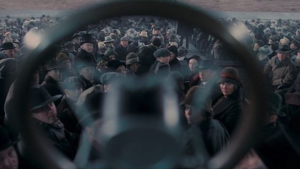10. Centro de Capacitación Cinematográfica (CCC, Mexico City, Mexico)

Image Source: (CCC)
The Centro de Capacitación Cinematográfica, A.C. (CCC) is a cinema academy belonging to Mexico’s Secretariat of Culture. It was established in 1975 to provide technical and aesthetic training to individuals entering the film industry. Since 2011, the CCC has been a member of the International Federation of Film Archives and the International Association of Film and Television Schools. It received the Award for Academic Excellence at the Tel Aviv Film School Festival in Israel in 2005 and the Golden Ariel in 2006 in recognition of its 30 years of educational activity and contribution to Israeli cinema. The other is the Centro Universitario de Estudios Cinematográficos of the National Autonomous University of Mexico. The Cinematographic Training Center trains highly skilled filmmakers in cinematography and artistic aspects. It is a school where its academic activity, production labor, and cultural dissemination have multidirectional effects.
Training
As part of their training, students create approximately 50 productions per year, including exercises, fiction segments, and documentaries. Additionally, with the support of FOPROCINE and the OPERA PRIMA commission, the CCC produces a fiction feature film and another documentary. The productions have garnered prestigious accolades, such as the Student Academy Award and the Palme d’Or at Cannes.
Purpose
The Centro de Capacitacion Cinematografica (CCC) is a film school to educate high-level professionals in cinematography’s technical and artistic aspects. It is an institution where academic pursuits, filmmaking, and cultural advocacy converge simultaneously.
Achievements
Each year, students produce approximately fifty activities, films, and documentaries. Through the OPERA PRIMA initiative, the CCC produces a fictional and a nonfictional feature-length film. These films have participated in approximately 250 national and international film festivals and have won prestigious honors, including the Student Academy Award and the Palm d’Or at Cannes. CCC is a member of CILECT (Centre International de Liaison des Ecoles de Cinéma et de Televisión) and FIAF (International Federation of Film Archives).
Courses Offered
| Licenciatura en Cinematografía (Bachelor of Arts – 4 years, Full-Time) | 9 Semesters |
| Film Script Course (short course) | 4 Semesters |
| Cinematographic and Audiovisual Production Course (short course) | 4 Semesters |
| Academic extension (short course) | Collaboration with institutes |
Contact
Calzada de Tlalpan 1670, Col. Country Club, Del. Coyoacán, Mexico City 04220.
Phone: +52 55 1253 94 90
Website: HOME – The CCC » Film Training Center (elccc.com.mx)
Fee Details
Certification of graduation is offered fee structure is:
Licenciatura en Cinematografía (Bachelor of Arts – 4 years, Full-Time) $1,800 – $3,600
For fee details refer: Centro de Capacitacion Cinemotografica | FilmSchool.org
Application Details: N.A.
Application Requirement
- Application Form: The CCC website has an application form for applicants.
- An interview may be necessary for the application.
- Portfolio: Some courses require candidates to submit a creative portfolio.
- Academic transcripts or validated secondary school records are necessary.
- Studying in Spanish requires all students to be fluent.
Closure
The Centro de Capacitación Cinematográfica (CCC) is well known for its unrelenting commitment to advancing technical prowess and creative innovation. The prestigious School offers prospective filmmakers a caring atmosphere perfect for developing their skills and creative expression.
Carrier Opportunities
The film business is well known for its highly competitive professions, making gaining relevant professional experience a crucial aspect of landing a good job. A very effective strategy for finding chances is networking. As a result, it is wise to start building professional contacts as soon as possible since doing so will greatly increase the chances that one’s activities will be successful.
There are two primary approaches to cinema studies degrees: those that emphasize the theoretical parts of film and filmmaking and those that combine technical and theoretical expertise. Getting real-world job experience in a certain profession may help people decide what career route they want to take after earning their degree.
Building a thorough archive of their work is crucial for anyone who wants to enter the field of filmmaking professionally. Utilizing the possibilities present during your academic journey to showcase your work successfully is highly advised. One way to do this is by actively participating in events like festivals and contests, where you may show off your abilities to a larger audience. Attending guest lectures and industry-related events is also advantageous since it allows you to network with people in your interest and get essential insights. Participating in these activities may improve your academic experience and build relationships that can be useful for your future pursuits.
Investigating work experience possibilities at neighborhood media organizations and theatres is one option. You may get useful first-hand knowledge about the sector by contacting these businesses. Inquiring about possible collaboration in their films in advance with indie filmmakers might also be helpful. Taking a proactive stance might lead to fascinating changes and provide you with the chance to develop new skills in the field of filmmaking.
Skills Developed
During a degree in film studies, you will typically develop expertise in film theory and filmmaking practice. Some courses may place a greater emphasis on film theory than others. Your technical skills include camera operation, studio production, sound recording, and editing, and you can specialize in a particular area of interest, such as screenwriting or film journalism. Develop skills in film and culture, cinema traditions, specific film genres, and how directors approach their work through film analysis.
Acquire a wider spectrum of abilities, such as:
- Research abilities involving critical evaluation
- Communication skills and the ability to articulate an opinion effectively; work to a predetermined brief independently or in collaboration; a flexible approach to work; and the capacity to respond creatively to ideas and queries; are all desirable.
- Self-discipline and self-direction the ability to adapt one’s writing to various audiences.
- The capacity to develop concepts into results; a resourceful and innovative approach to work.
Curriculum Of Film School
The curriculum of a film school is often structured on fundamental knowledge in all aspects of filmmaking, in addition to giving a variety of elective and specialty course options. After completing the required coursework for the program, students at various film schools can specialize in theatre or television, and film after completing the core curriculum. While some film schools emphasize acting and directing more than others, others, such as animation design and visual effects schools, highlight a single area of expertise. Prospective students should research to find educational institutions that offer programs in filmmaking that most pique their interest—film schools worldwide, including in Germany, Israel, and Australia. The United States is home to many prestigious film schools.
Categories in film school
1. Producing
Budgeting is only one aspect of the production management tasks involved in making a movie. The goals of a producing course are to teach students to:
- Write scripts.
- Handle finances
- Locate potential financing sources.
Please read our blog on film funding to know about the financial prospects while filming your script.
2. Direction
To direct a film is to oversee its creation from the page to the screen. Directors often provide original ideas to a film’s cast, camerawork, and setting. Lessons in direction may cover topics such as:
- Actors cast
- Make rehearsals
- Team up with the cast
- Art direction
The art director and the production designer work together to bring a film’s visual concept to life. Art directors of the future learn to:
- Create sets and sceneries
- Construct or acquire props
- Add minor items to “dress” a set, giving it a lived-in, authentic appearance.
3. Screenwriting
Film students also learn about screenwriting or composing screenplays for moving pictures and television. Among the most crucial aspects of screenwriting are the following:
- Plot description
- Dialogue
- Formation of Character
- Cinematography
The cinematography curriculum emphasizes the technical elements of working behind the camera. The skills taught in a cinematography course include:
- Start a filming device.
- Find the ideal lighting conditions.
- Light the scene.
- Use a wide range of film stocks in work.
- Make camera movement
- Create a shot.
4. Postproduction
After principal photography is complete, the film enters a phase known as postproduction. Students in these programs can work with modern innovative technology. Students enrolled in postproduction courses learn about:
- Color grading
- Film editing
- Acoustics
Frequently Asked Questions
1. What is the most competitive cinema school?
USC is one of the most competitive institutions for admission. It has an 11% acceptance rate. This institution offers a variety of programs for students interested in pursuing careers in the Los Angeles cinema industry.
2. What is the finest degree for a career in the film industry?
Animation is the best option. It is the study of art and art history. Film, game design, and graphic design are all examples of creative / design fields. Further, you can consider Photography, Web Development, Multimedia Design, and Visual Communications.
3. Which nation has the most robust film industry?
Since the early 20th century, the American film industry, commonly referred to as Hollywood, has had a profound impact on cinema around the globe. The United States film industry (Hollywood) is the world’s earliest and largest film industry in terms of revenue.
4. Is it simple to find employment after film school?
There is no singular path to employment after film education, which can be liberating and intimidating. However, any graduate with a firm arsenal of skills and knowledge will find life and employment opportunities.
5. What is the most profitable job in the film industry?
Executive Producer, Screenwriter, Director, and Event Manager are among the film industry’s highest-paying positions.
Ending Note
Courses in film studies allow you to conduct additional research in your major. Different courses may have research expertise in specific areas, such as film history or film theory; therefore, it is important to examine the particulars of each course thoroughly. Masters-level opportunities exist in related fields, such as international film production, filmmaking, film curation, scriptwriting, documentary film, and film direction, allowing you to develop a specialization. Some master’s degree programs include television, video, creative media, and film. You could also pursue research at the Ph.D. levels. Pursue additional education to specialize career. To work in film promotion, for instance, some cinema studies graduates may pursue journalism, public relations, advertising, or event management.












